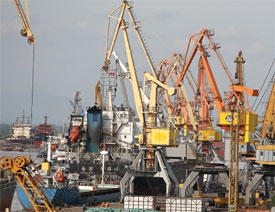Shipping firms sail into rough seas
 |
| Shipping firms claim they are doing little more than passing on rising business costs |
The Ministry of Finance (MoF) has just proposed the government to establish a taskforce to work with a number of foreign shipping firms, including Vietnam-based agencies, on their service charges, which were said to be hurting local importers.
The group would include representatives from the MoF, Ministry of Transport, Ministry of Industry and Trade, National Shipping Lines Corporation (Vinalines), Vietnam Seaports Association, Vietnam Chamber of Commerce and Industry, and Vietnam Shippers’ Council.
“The fact that foreign ship owners massively increased their service prices is a form of price-related monopoly, which is badly affecting local enterprises.
It has resulted in rising export-import costs, amid the country’s soaring inflation,” the MoF told the government.
The proposal came after locally-owned Devyt logistics company, which on behalf of many local importers, asked the government for help because many foreign shipping firms were applying three types of extra charges including port congestion surcharges, terminal handling charges and container imbalance charges. For example, due to container imbalance charges alone, on average firms are being charged an additional $55 for a 20-foot container and $110 for a 40-foot container to be transported.
Specifically, since 2008, while terminal handling charges have been applied daily as per international practice, port congestion surcharges are applied when ports are congested by goods. Ship owners often collected container imbalance charges at peak times when import goods outnumbered export ones.
According to Devyt, it was charged a total of $295 to receive a 40-foot container and $184 for a 20-foot container.
The MoF said the three charges were not subject to its regulations on maritime charges and dues. “Thus this is just a measure to augment transport charges,” said MoF Deputy Minister Do Hoang Anh Tuan.
Quang Ninh port’s deputy director Bui Quang Dao said those charges had been common practice in ports for several years.
“Ship owners often seek all types of reasons to increase and invent new charge levels. Such charges can relate to port congestion, security and petroleum price hikes,” Dao said.
Vu Duc An, head of Haiphong port’s business section, said he expected the situation would be more and more serious because no punishments were being applied to foreign ship owners.
However, a DHL Global Forwarding Vietnam Corporation representative in Hanoi said foreign ship owners imposed the three charges because they wanted to collect more cash to compensate for climbing expenditure caused by soaring petroleum prices.
“Such ships are foreign-owned, so transport-related charges are based on global contracts with specific clauses. These are shared by foreign country ships not subject to Vietnamese law.
“If local customers accept such charge levels, foreign ships will carry their goods. I think that the best way to solve the problem is that foreign ship owners and customers re-negotiate the charge levels,” she said.
The source noted that the proposed taskforce could only make the charges clear while not being able to punish foreign ship owners.
Tuan blamed the port congestion surcharges and container imbalance charges on Vietnam’s weak port infrastructure. For example, Haiphong city’s Dinh Vu port’s roads have seriously deteriorated and were frequently congested.
“Vietnam’s big trade deficit is also to blame, which is annually equivalent to 20 per cent of total export turnover. In 2010, the trade deficit figure was $12.6 billion. Thus during peak time, the quantity of imported goods containers far outnumbered that of exported goods containers,” Tuan said.
At present, there are about 60 foreign shipping firms in Vietnam, transporting 80-85 per cent of Vietnam’s exports and imports.
What the stars mean:
★ Poor ★ ★ Promising ★★★ Good ★★★★ Very good ★★★★★ Exceptional
 Tag:
Tag:
Related Contents
Latest News
More News
- Hermes joins Long Thanh cargo terminal development (February 04, 2026 | 15:59)
- SCG enhances production and distribution in Vietnam (February 04, 2026 | 08:00)
- UNIVACCO strengthens Asia expansion with Vietnam facility (February 03, 2026 | 08:00)
- Cai Mep Ha Port project wins approval with $1.95bn investment (February 02, 2026 | 16:17)
- Repositioning Vietnam in Asia’s manufacturing race (February 02, 2026 | 16:00)
- Manufacturing growth remains solid in early 2026 (February 02, 2026 | 15:28)
- Navigating venture capital trends across the continent (February 02, 2026 | 14:00)
- Motivations to achieve high growth (February 02, 2026 | 11:00)
- Capacity and regulations among British areas of expertise in IFCs (February 02, 2026 | 09:09)
- Transition underway in German investment across Vietnam (February 02, 2026 | 08:00)




















 Mobile Version
Mobile Version